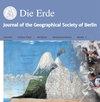Contested extractivism: actors and strategies in conflicts over mining
IF 0.6
4区 地球科学
Q3 GEOGRAPHY
引用次数: 13
Abstract
This article focuses on the question of how the worldwide emergence of conflicts over mining, and particularly in Latin America, can be explained. It aims at systematizing contemporary conflicts over mining. Based on existing case studies and our own research in Colombia, it investigates the issues at stake in conflicts over largescale mining, the strategies which local actors apply, and the factors influencing their actions. The analysis combines theoretical concepts from the study of contentious politics with concepts from spatial theory. The empirical examples demonstrate that conflicts over mining are embedded in overriding processes of transformation in which global processes (the resource boom) come together with national politics and the symbolic and material meaning of specific locations. Political opportunity structures – political programs, institutions, laws, regulations, changes in government and regimes – are pivotal for local conflicts. Protest actors search for allies, responsibilities and solutions on the local, national, or transnational scale. An important characteristic of conflicts over mining is the particular meaning of specific places. This is shaped by the physical-material existence of resource deposits and at the same time by various cultural attributions. In this article, it is demonstrated that both these dimensions of place are relevant to the demands and strategies of collective actors.有争议的采掘主义:采矿冲突中的行动者和策略
本文的重点是如何解释世界范围内出现的采矿冲突,特别是在拉丁美洲的冲突。它的目的是使当代关于采矿的冲突系统化。根据现有的案例研究和我们自己在哥伦比亚的研究,报告调查了大规模采矿冲突中的利害问题、当地行动者采用的战略以及影响其行动的因素。分析结合了争议性政治研究的理论概念和空间理论的概念。经验例子表明,围绕采矿的冲突嵌入了压倒一切的转型过程中,其中全球进程(资源繁荣)与国家政治以及特定地点的象征意义和物质意义结合在一起。政治机会结构——政治计划、制度、法律、法规、政府和政权的变化——是地方冲突的关键。抗议参与者在地方、国家或跨国范围内寻找盟友、责任和解决方案。采矿冲突的一个重要特征是特定地点的特定含义。这是由资源矿床的物理-物质存在,同时也受到各种文化属性的影响。本文论证了这两个地方维度都与集体行动者的需求和策略相关。
本文章由计算机程序翻译,如有差异,请以英文原文为准。
求助全文
约1分钟内获得全文
求助全文
来源期刊

Erde
GEOGRAPHY, PHYSICAL-GEOSCIENCES, MULTIDISCIPLINARY
CiteScore
2.90
自引率
6.20%
发文量
0
审稿时长
>12 weeks
期刊介绍:
DIE ERDE is a publication of the Geographical Society of Berlin
DIE ERDE is a scientific journal in Geography, with four issues per year with about 100 pages each. It covers all aspects of geographical research, focusing on both earth system studies and regional contributions.
DIE ERDE invites contributions from any subfield of both Physical and Human Geography as well as from neighbouring disciplines.
 求助内容:
求助内容: 应助结果提醒方式:
应助结果提醒方式:


